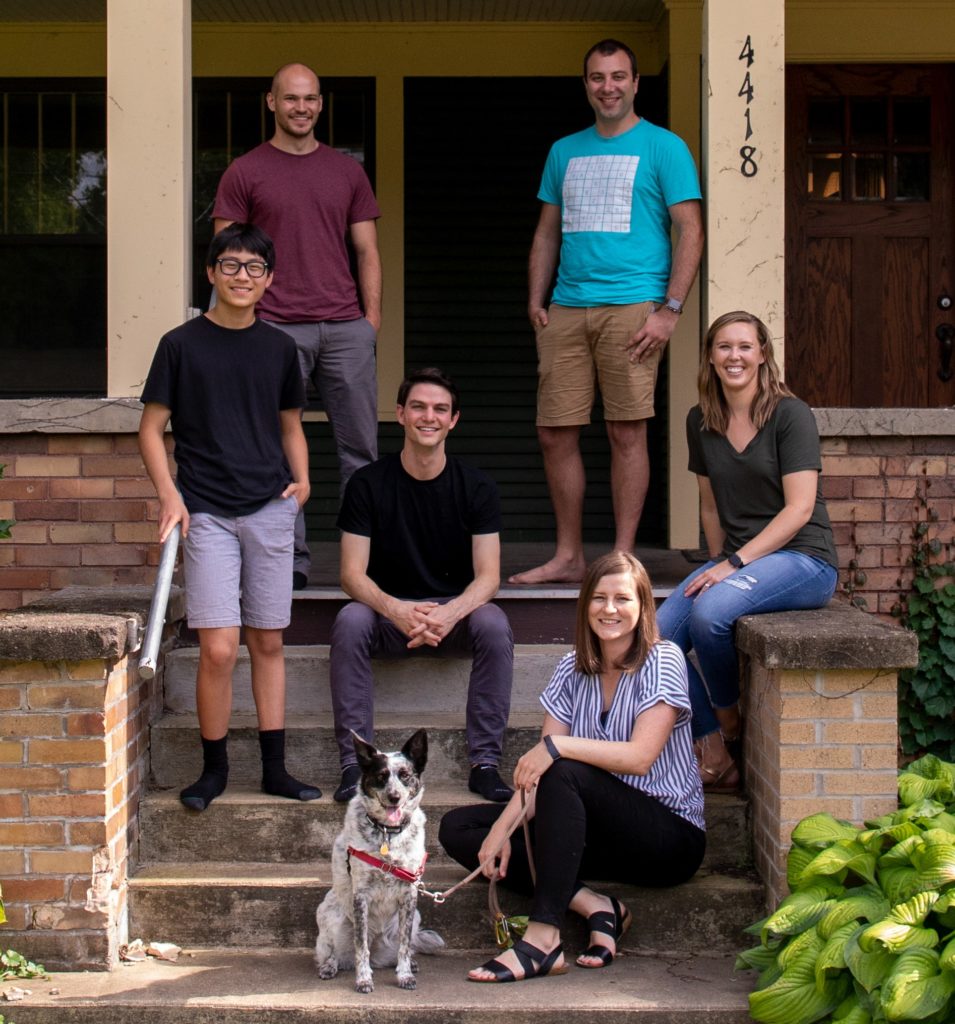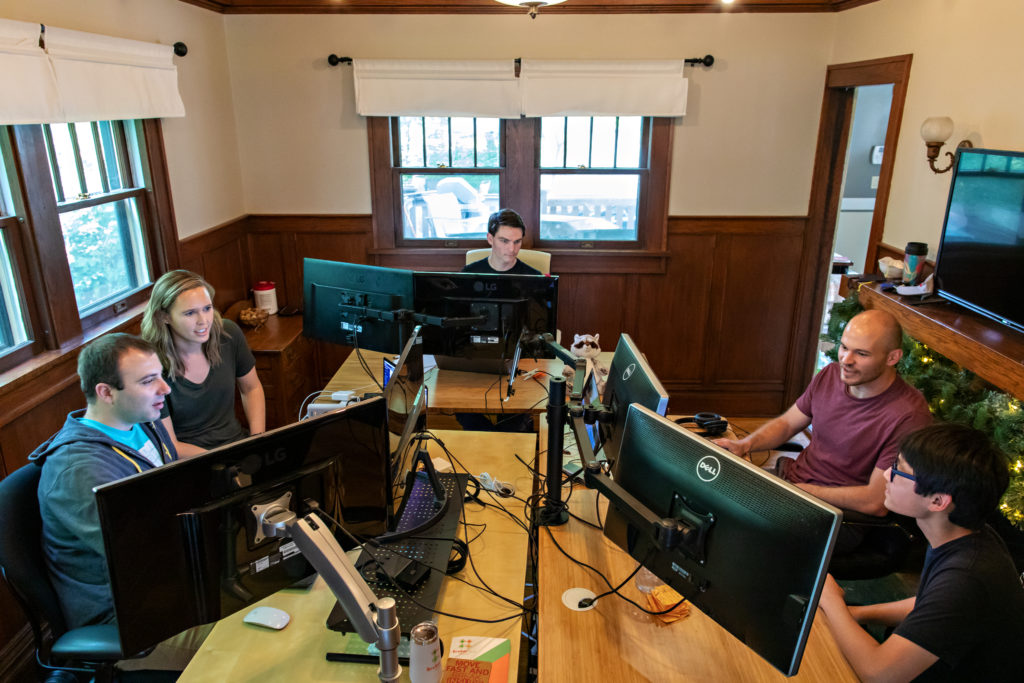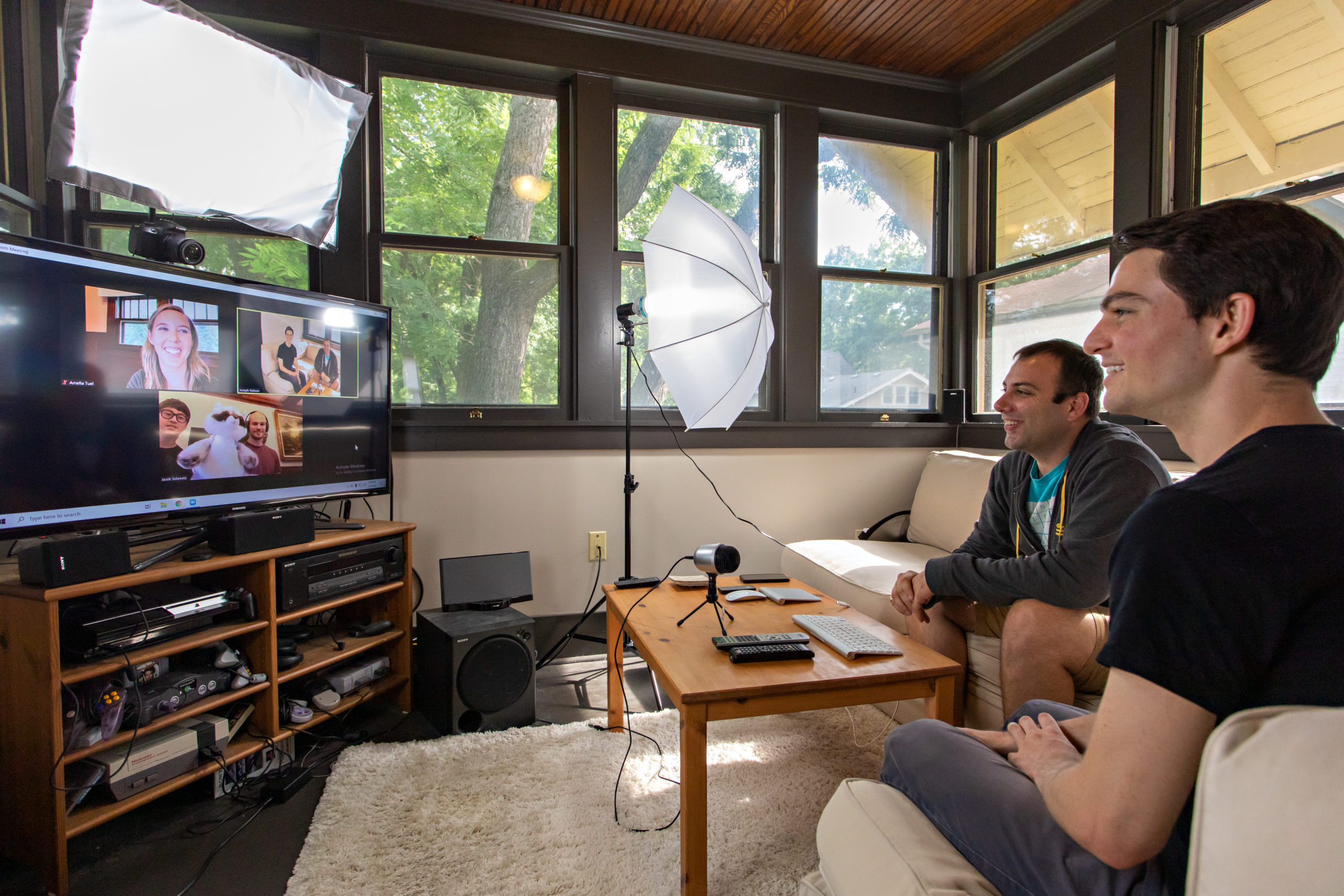
Roboflow staff on the startup’s house porch. From left, back row: machine learning engineer Jacob Solawetz and co-founder/CTO Brad Dwyer; middle, software development intern Jim Su, co-founder/CEO Joseph Nelson and sales development representative Amelia Tuel; front, chief barketing officer Kelo and UX designer Amanda Morrow. Photos provided 
Roboflow staff working in the house’s dining room.
At the start of 2020, Roboflow co-founders Brad Dwyer and Joseph Nelson were not used to working in the same city. Funny enough for this startup, the COVID-19 pandemic brought them under one roof.
After launching in August 2019, the pair had set into a rhythm of remote work: Nelson took turns alternately visiting Des Moines and hosting Dwyer in Washington, D.C. In February, the pair worked together in Taiwan for a week; the two had initially planned to go down to Florida at the start of the summer months and spend time there.
But of course the pandemic hit, with Dwyer in Iowa and Nelson locked down in a Florida Airbnb for six weeks. While some of the work on making Roboflow grow be done at a distance, the pair knew their company could be more efficient when they got to work together — so Dwyer and Nelson came to a conclusion that, frankly, a lot of co-founders would probably not want to make: They moved in together on June 1.
“You’re not supposed to spend time with people you’re not living with — well, life hack, why don’t we just live together?” Dwyer said.
Team Roboflow is renting a three-story house until September, giving the startup guaranteed time together as the not-yet-year-old company establishes roots. Machine learning engineer Jacob Solawetz, who was hired by Roboflow in early May, also moved in early June.
The three are now visited regularly by software development intern Jim Su, sales development representative Amelia Tuel, UX designer Amanda Morrow, and Kelo the dog.
“Culture is built from things of spontaneity, and in a remote world everything is scheduled. That makes interactions feel really goal-oriented, when a lot of times relationships are built from happenstance,” Nelson said.
On the first floor, the Craftsman-style house’s dining room holds a jigsaw puzzle of standing desks and computer monitors (backed nicely by a fireplace and the team’s unofficial plush mascot, Lenny the Roboflow Raccoon). The front living room has a whiteboard on standby for team meetings.
After losing speaking and networking opportunities as conferences were canceled, Roboflow turned to YouTube and blog content to raise the word-of-mouth profile of the company. On the second floor, the team set up a YouTube filming studio with a green screen and an adjacent, designated videoconferencing room decked out with professional camera lighting, a TV monitor and a white sectional sofa.
The whole setup, combined with three staff members’ 24/7 presence and reminders of the startup’s fieldwork in artificial intelligence through computer visioning, brings a certain energy to the house. On Fridays the team has a happy hour at the backyard fire pit; when a major update to the influential YOLO object detection model broke on GitHub in mid-June at 9 p.m., Dwyer, Nelson and Solawetz worked overnight to understand it and develop tutorials for launch the next day, which drove industry traffic and attention their way.
“There’s this buzzing energy in the house where Jacob, Brad and I all hunkered down at 2 a.m. to be sure we could support it in Roboflow, and then the next day release it. That made it to the front page of a number of online forums and drove quite a bit of traffic,” Nelson said. “It’s things like that where the energy is palpable, and it’s exciting.”
There are challenges when hours blur between being on and off the clock. The arrangement means Dwyer is living apart from his wife for the time being, and Nelson moved his life from D.C. to Des Moines for the summer. Developing balance in work hours and life is already a struggle in startups, which both Nelson and Dwyer have already experienced as second-time founders.
“I think back to my early days of Hatchlings, and I had an alarm on my phone that went off every hour on the hour, all the way through the night where I would wake up, I would roll over, look at my phone and see if there were any new users. If it said zero new users, then the servers had crashed and I had to pull myself out of bed at 4 a.m. and figure out why,” Dwyer said. “The default of the startup is the startup’s going to die, and you have to will it into being a company instead of an idea.”
Added Nelson: “Especially for Jacob and his relationship with us, [it’s important] he knows that even if we’re still at our desk at X time in the day, there’s no expectation for him to do the same. I think we’re fortunate that he doesn’t struggle to identify where the boundary is, but I personally kind of do.
“It’s not a complaint so much as it is the awareness of making sure you can stay healthy and excited, and do your best work every day.”
While an ongoing pandemic has changed some logistical operations, it hasn’t seemed to change how Dwyer and Nelson approach Roboflow’s growth. Big competitors quickly faced rebuilding company infrastructure to support work-from-home, but the startup was building from scratch anyway.
“You have to make something that people need, and it almost holds you that much more accountable,” Nelson said. “Being able to see traction and growth in current conditions is encouraging to some degree, that we’re onto something that we know people need regardless of the outcome.”
National lockdowns essentially negated the need for Roboflow and other startups to spend time networking in target cities like San Francisco. “All the people in San Francisco are also locked in their apartment; they’re just paying five times as much for it,” Dwyer noted.
“It is really encouraging that you don’t have to be in-person at an event for people to recognize the importance of what you’re working on and the fact that you solve their problem,” Nelson said. “The things that we’re adapting will still be true if and when things return to what they looked like circa December 2019.”
The whole experience opened Dwyer and Nelson to the idea of a yearly staff retreat once travel is safe again — allowing employees to work remotely the majority of the year, then gather together for a week in a new place, as the two had in Taiwan before the COVID-19 lockdown.
“I think that’s going to be a big part of our culture,” Dwyer said.
An end date on the house lease in late September gives the time an outlook as well — that although the state of the COVID-19 virus is indefinite, daily life and development at Roboflow will move on.
